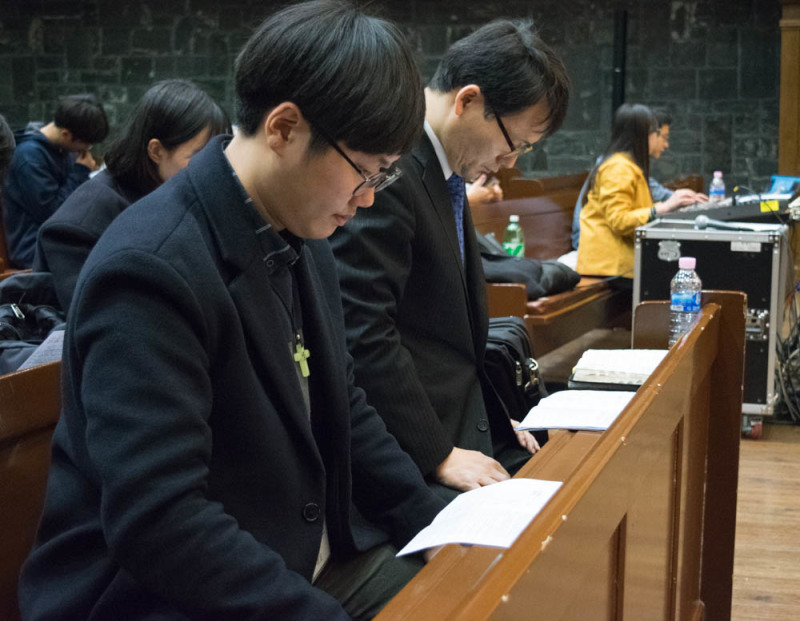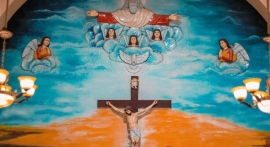
SEOUL, South Korea- Around 100 students from Christian clubs across one of Korea's most elite colleges, Yonsei University, gathered for a joint worship service on a recent weekday evening. The subjects of their prayers reflected their anxieties: the Korean economy, unifying North and South Korea, the expansion of Christianity and corruption in Korean churches.
College students in South Korea are studying to enter a highly competitive job market, and youth unemployment reached its highest point since 1999 last year. With secularism on the rise and scandal rocking some of South Korea's largest churches, some students harbor antipathy toward Christians. These pressures collide at Yonsei University, a traditionally Christian school that also prides itself on being one of South Korea's three most prestigious universities. While many students are withdrawing from religious life on campus because of these challenges, others are redoubling their involvement.
"Christian students' involvement is reduced because they are busy with finding jobs and with their own situations," Yonsei chaplain the Rev. Meehyun Chung said. "It isn't that they are selfish, but the economic system has forced them to not have a broad-minded perspective."
Though Yonsei students take four semesters of mandatory chapel classes, Seil Oh, a sociology professor at Sogang University who studies youth religious involvement, observed that Yonsei students didn't pay attention during chapel class. This experience was echoed by Sang Min Park, a senior studying English literature and language.
Park said he came to Yonsei in part because of the school's Christian identity, but he was disappointed to see other students' apathy toward chapel classes. That disillusionment motivated him to get more involved in Christian life on campus to "rebuild the campus as a university for God."
He became the leader of Yonsei's Christian Student Union, an umbrella organization that unifies all the other on-campus Christian clubs. At a recent all-campus ministry worship service, Park jumped from the front pew to the stage to introduce each speaker and transition between parts of the program. He wore a distinctive aqua-colored crucifix around his neck on a black cord.
"Christians are the ones being mocked. [Secular people] don't like Christians because there has been a lot of wrongdoing in Christian churches, and it's hard for them to see that it's only a few cases," Park said.
Park refers to harsh criticism facing star pastors at large Protestant churches for embezzling funds, nepotism and sexual misconduct.
Jihoon Chung, a first-semester graduate student at Yonsei who described himself as a minimally involved Christian, said some of his Christian friends left churches after the scandals. "They thought, 'I am not a good Christian person, but the pastor must be better than me. But it turns out, he also does not good things.' So they think, 'How can I be interested in Christianity?' It was hard for me to explain to them," he said.
Park said his foundation in his faith was strengthened through morning prayer. He went on a mission trip to Egypt in January 2016 and said he enjoyed supporting missionaries there, but doesn't want to become one. While South Korea is one of the world's largest missionary-sending countries, Park said he sees his mission field in the mainstream workforce.
"Most pastors have never been in society, but they have to preach to people who are in society. How can somebody talk about something they have not experienced at all? At least, at this age, I still have a chance to get into society," Park said.
Career choice is a key concern for South Korean young people, as youth unemployment hit its highest point last year since the government started tracking the number in 1999. The Rev. Jikhan Koh has worked in campus ministry for more than 40 years, and has seen labor market trends impact students and concerned parents.
"Students could previously get a job easily when they graduate, and now students are depressed by the job situation," Koh said.
For Chaelin Kim, 23, her choice of college major put her at odds with her family. Kim's family is religiously diverse: her father is an atheist, her mother is a Catholic who almost became a nun, her grandmother is Buddhist and her cousin is a shaman.
Kim became Christian after she finished taking the Korean version of the SAT because she ran out of excuses to give her friends who had been inviting her to church. After moving to college and attending church services at Yonsei University Church for several months, she was baptized.
"They weren't just friends. They were trying to share the gospel of Christianity and how Jesus died and resurrected," Kim said.
At a campus ministry called Emmaus, Kim has risen to a leadership position. During a recent meeting, she made sure no one was left out of conversations and gave directions to new students. Soft-spoken, she flashes a kind smile to everyone she encounters.
As Kim became more involved in her faith, she wanted to change her major from occupational therapy to theology. Her father was staunchly opposed to the change because he thought that theology was a "useless major."
"I was really mad because my father wasn't listening to me," Kim said.
Kim has since settled on a double major in theology and political science. She plans to get a master's degree in global health policy. While she has career ambitions, she said she sometimes feels like an outsider when discussing careers with her secular friends.
"After I became Christian I had a time that I said to God, 'God, I am fine if I am not successful in the future. I want to participate in your work,'" Kim said. "My purpose and goal have changed."
















